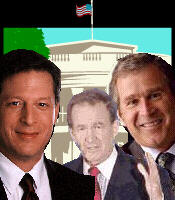 |


NGLTF Releases 56-Page Report titled What's at Stake? 2000 Campaign Shows Gay Vote is Playing a Major Role |
|
Compiled By GayToday
The 56-page report places the year 2000 election in recent historical context, documents the emerging GLBT voting block, discusses American public opinion on GLBT equality and tracks the dramatic increase in GLBT-rights legislation at the state and local level. The report also documents the major candidates' statements and votes on six key issues -- hate violence, discrimination, parenting, partnerships and marriage, health care, and military service-- and provides data and research to provide a factual context for these policy debates. "Across the United States, a consensus is emerging for equality," said Virginia M. Apuzzo, NGLTF spokeswoman and holder of the Virginia Apuzzo Chair for Leadership in Public Policy at the Policy Institute of the National Gay and Lesbian Task Force.
Apuzzo noted that the country has changed significantly over the past decade. Today 103 million people, or 38 percent of the American public, live in cites, counties or states with laws banning sexual orientation discrimination; in 1990 less than 20 million people lived under such laws. 70 percent of the U.S. public supports the right of gays and lesbians to serve in the military, according to a 1999 Gallup poll, up from 55 percent in 1992. Half of Republicans support anti-discrimination laws according to a 1996 National Election Study survey, while two-thirds of independents and three-fourths of Democrats also support such laws. So in opposing basic civil rights for gay, lesbian, bisexual and transgender people, the Republican presidential candidates are not only out of touch with middle America, they are also out of touch with their own party's rank and file. What's at Stake documents the increasing strength of the GLBT electorate. In the 1996 presidential election, 5 percent of voters self-identified as gay, lesbian or bisexual -- a figure that would undoubtedly be higher if more GLB voters were willing to tell exit pollsters their sexual orientation. The GLB electorate is now roughly the same size as the Latino voting block and larger than the Jewish vote. What's at Stake also discusses the dramatic growth in GLBT rights legislation at the state and local level, and explains the gulf between U.S. public opinion and national leaders on GLBT issues. "Presidential and congressional candidates who oppose GLBT equality are out of touch with the voters," said Apuzzo. "Through the past decade, we have seen a groundswell of support not just in America's largest cities, but also in small and mid-sized communities across the heartland. This is testimony to a number of factors, including the success of local organizers, the importance of coming out to one's family, neighbors and colleagues, and an overall increased understanding regarding issues of sexuality." What's at Stake may be downloaded for free at www.ngltf.org/pub.html or purchased for $10 by calling 202-332-6483, ext. 3205. |


